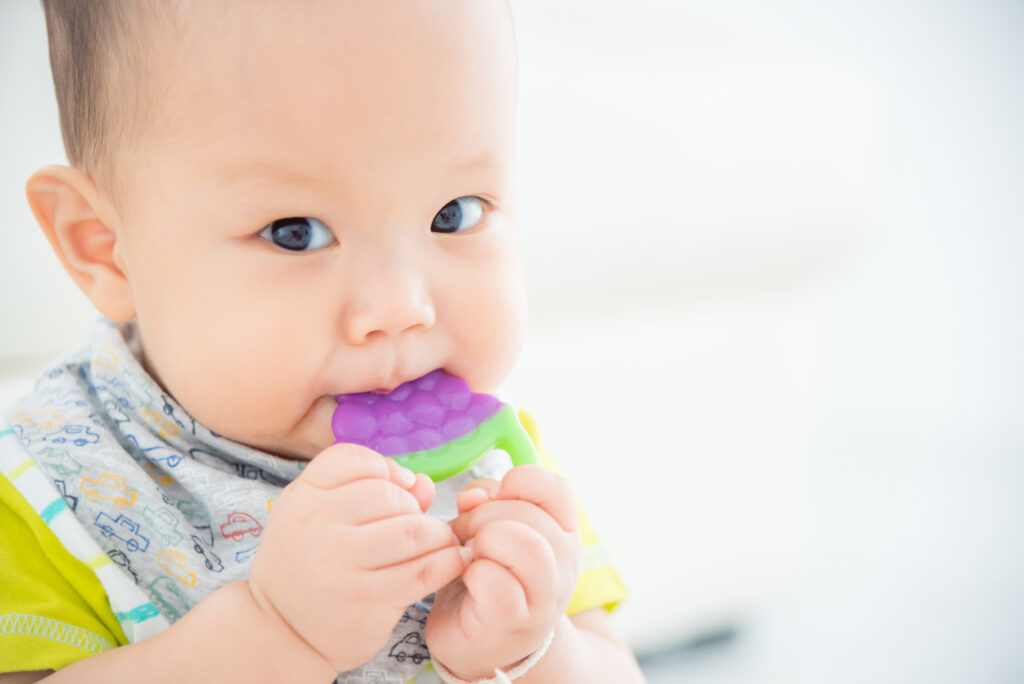What’s The Best Way to Floss
We all know we should floss, but it can be tough. Part of this is because flossing can feel like an extra task in an already busy day, but it...

Teething is an important developmental milestone in your baby’s life. Of course, you want to navigate this phase as painlessly as possible. But, as you might have noticed, parenting often comes with a lot of conflicting and confusing advice. And teething is no exception.
We are here to dispel some common teething myths and arm you with factual, useful information to guide you through your child’s teething process.
Teething generally begins around the age of six months but can start as early as three months or as late as twelve months. During this period, infants will experience the gradual emergence of their first teeth, typically the lower front teeth. The complete set of primary teeth usually arrives by the age of three years.
Every baby (and caring parent) goes through the teething stage. And we know it can be tough. But knowing what is true and what is not can help you and your baby make it through a little more smoothly.
A pervasive myth is that teething causes a high fever. Medical experts agree that while teething might cause a slight increase in body temperature, it does not cause a significant fever. Technically speaking, a fever is a temperature above 100.4. Teething might bump your baby’s temp a little bit, but it is extremely unlikely to raise it enough to top 100.4. If your baby does develop a high fever during the teething phase, it is likely due to other illnesses and should be checked by a pediatrician.
Similarly, teething does not cause diarrhea. It is more likely that your child’s changing diet, which coincides with teething, is to blame. As with a fever, if your child experiences persistent loose stools, see your pediatrician. Don’t brush off these symptoms because your child is teething.
It’s a fact that teething can be uncomfortable for babies. As teeth erupt through the gums, babies may show signs of discomfort, including fussiness, trouble sleeping, drooling, and seeking to chew on objects. Mild symptoms are normal, but if your baby seems particularly uncomfortable, consult your pediatrician or dentist for advice on pain relief methods. Teething rings or a clean, wet washcloth kept in the fridge (not freezer) can provide some relief.
Not all babies lose their appetite when teething, though some might show less interest in feeding due to gum discomfort. It’s important to continue offering food and monitor their intake to ensure they receive adequate nutrition. If you notice a substantial decrease in appetite that worries you, consult your child’s pediatrician.
It’s true that chilled (not frozen) teething toys can help soothe inflamed gums. The cold helps numb the area, providing temporary relief to discomfort. Ensure these items are safe for babies, easy to clean, and never hard enough to damage baby’s emerging teeth or delicate gums. While teething aids might feel awkward or uncomfortable for the baby initially, they generally adjust quickly.
Be cautious with teething gels. Some contain substances like benzocaine, which can be harmful to babies. Always consult with your baby’s healthcare provider before using medicated products on your baby’s gums.
Good oral hygiene should start the moment the first tooth appears. Even before teething starts, you can clean your baby’s mouth after feedings by wiping the gums with a soft, damp cloth. As teeth emerge, use a baby-sized toothbrush with a bit of toothpaste no larger than a single grain of rice. Around the time that first tooth appears (but no later than 12 months), it is time to schedule your baby’s first dental appointment.
Understanding what to expect during teething and how to effectively manage it can make this developmental stage easier for both you and your baby. Remember, every child is unique, and what works for one might not work for another.
If you have concerns about your child’s teething or oral health, don’t hesitate to contact our office. Our team is here to support your family’s dental health through every stage of your child’s development.